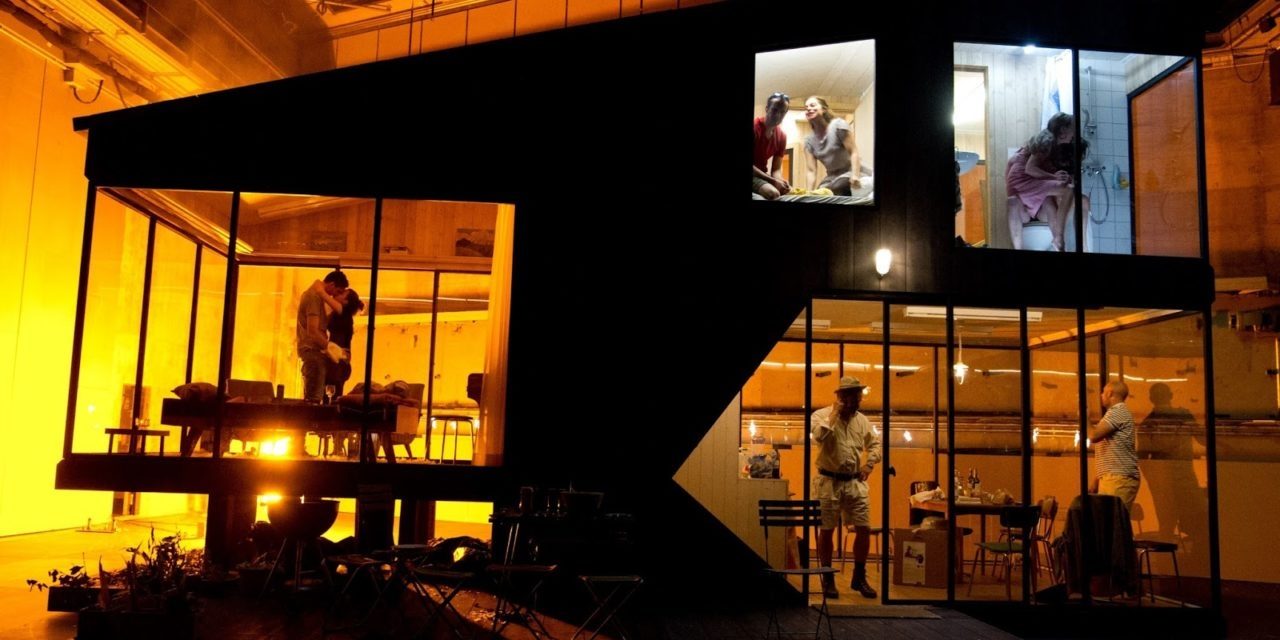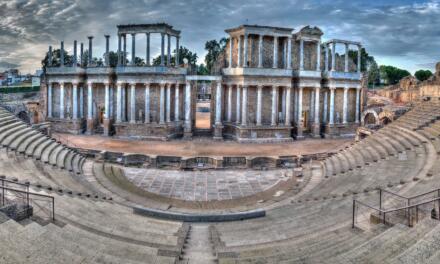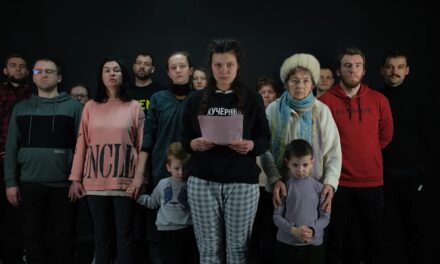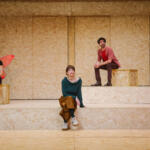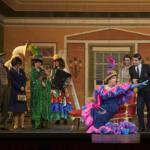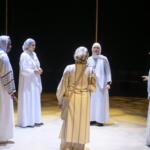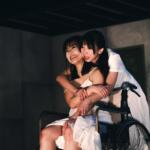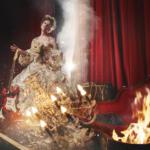It was an achievement that West Kowloon Cultural District Authority and Goethe-Institut Hong Kong invited two of the seven juries of this year’s Berliner Theatertreffen to hold a two-day seminar called Theatertreffen in Hong Kong on the renowned festival, as well as a discussion between the seminar participants and the juries.
Before we the participants attended the seminar, we had to watch all the ten productions that were selected as ‘notable productions’ among 377 productions produced within the German-speaking region in the past season.
The style of these 10 productions varies. From traditional theatrical approach like Thalia Theatre’s Der Schimmelreiter (The Rider on the White Horse) to Schauspiel Dortmund’s Die Borderline Prozession (The Borderline Procession), an environmental theatrical feast of multi-media display, the selected pieces shows that Berliner Theatertreffen strives to encourage the liberation of the theatre art form, and to find new possible ways to define theatre.
As Till Breigleb, one of the seven juries, stated in his introduction to the seminar, “the most dangerous sign of the times for the performing arts is the dominance of the new media,” thus theatres “really need to convince younger people of the physical event (of theatre) because in Germany, like in the rest of the world I suppose, the smartphone generation is very often satisfied with the entertainment of the digital form.”
This is one of the elements Breigleb mentioned that encourage the Theatertreffen to focus on new representations of theatre other than its conventional narrative, though the convention is still respected.
One can see that both Der Schimmelreiter and Residenztheatre’s Die Räuber (The Robbers), one is an adaptation of the 1888 German novella by Theodor Storm, and the other a modern take on the classic German play by Friedrich Schiller in 18th century, are still under the convention of a theatre production, which requires the audience to focus and listen to the text more than to perceive a lot of spectacles.
However, there are some other productions like Simon Stone’s Drei Schwestern (Three Sisters), a modern adaptation of Chekhov’s Three Sisters where an actual house is built on the stage, trying to break the conventional perspective on how to see a theatre piece.
In Drei Schwestern, as the house is revolved during the show, actors act in the house in a very naturalistic way, thus the audience can experience something that is more cinematic as well as multi-focus.
Schauspiel Leipzig’s 89/90, an adaptation of Peter Richter’s novel about the stress of a group of young people in East Germany during the period before and after the breakdown of German Democratic Republic, which they profess different ideologies, is another example of multi-focus. By merging choral singing as the main body of the piece, with multi-media and post-modern delivery of the text, it pushes the audience to imagine the feelings of the characters as a whole, rather than to tell the audience what the story is about.
With spectacular scene changes, both of the productions manifest, or to say reimagine, a form of storytelling that defies what theatre supposed to be, but to enhance what theatre can give to the audience.
Then, of course, shows like Die Borderline Prozession, Forced Entertainment’s Real Magic, and Milo Rau’s Five Easy Pieces go beyond to the spectrum of redefining theatre.
Yet, it is unsubtle to see that most of the productions have the undertones to express political and social issues. Breigleb stressed that, “[t]he underlining of political aspects with performing arts that was much stronger in the last two years when the refugee crisis seems to split the German society in right and left.”
Simon Stone’s Drei Schwestern is an obvious example which the production replies to the political status in Germany right now, where the sisters, just like the sisters in Chekhov’s play, are wondering to leave their own country to a place that they can be free.
89/90, directed by Claudia Bauer, is another obvious one, which according to Breigleb, “looks back to the breakdown of the GDR and the changes people had to suffer during the transformation process of capitalism with all its disappointments.” Doesn’t this somehow resonate to how people feel about politics in recent years as well?
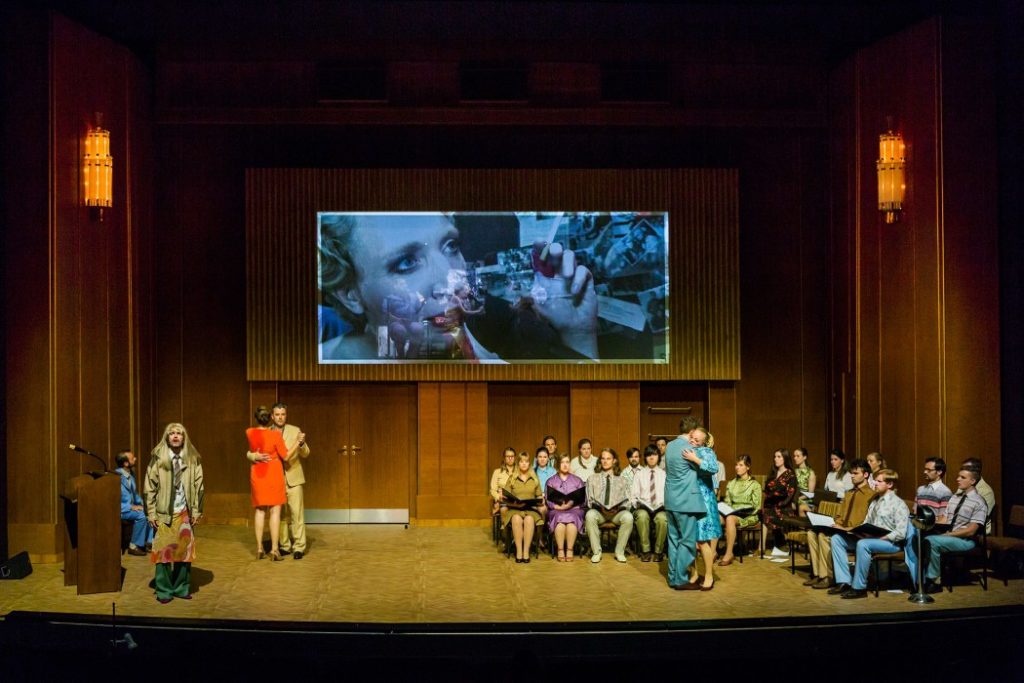
89/90. Photo Credit: Rolf Arnold
Not to mention that Die Räuber and Der Schimmelreiter, even though their representations are more conventional, still hit the topic of populism and resistance to innovation. Five Easy Pieces directly discusses a controversial topic of child-murder with the documentary theatre form.
These are productions that do not hide their voices for political reflections.
Thus, during the seminar, the topic of political theatre is discussed, and as the current political situation in Hong Kong as well as the narrowing of censorship, some of the participants and artists attended were stressing their concern on whether Hong Kong does have a future to do theatre with a strong political aspect.
The discussion was heated by the participant’s enthusiasm. Some said that it is hopeless to do theatre as the censorship is just so defeating, while some others said that theatre is always linked with politics, but it is the way of how one can do theatre under heavy censorship.
Personally, I think this is not just a situation that only Hong Kong needs to concern about. The political turmoil around the world does affect some aspect of freedom of speech, and as a theatre artist, I think this is the time for artists to create theatre that really concerns us, both politically and personally. The point is how to balance it between art and activism.
In the seminar, Breigleb stressed that he firmly believes that theatre should not change the world. What he means is that theatre should not be activism, but it should have the spirit to voice for activism, thus it is still an art, to liberate people to think.
I do agree to that, but to do so, it needs skills, and I think this is the main problem of whether artists have the vision to look beyond politics and “talk” about politics through their artwork.
As for the 10 productions selected, not all the productions were fonded by all the juries. One controversial production is Die Borderline Prozession, which Breigleb could not stress enough of how he dislikes the production, thinking that it is old-fashion as he has already seen a lot of similar productions just like that.
In the seminar, participants also had a distinctive mixed feeling about this production. Some of them loved it, while some of them hated it so much. This inspires me to question on the mechanism of how were the 10 productions selected if there was a divided perspective among the juries towards a show?

Die Borderline Prozession (The Borderline Procession). Photo Credit: Birgit Hupfeld
Eva Behrendt, the other jury who came to the seminar, did arise the question of whether the jury of seven is enough to represent the German-speaking theatre. “Are they still qualified at all, when reviews and newspapers are losing customers and influence while on the internet, everybody is a life-reviewing expert? With the number of seven, even if they all have very individual tastes, don’t they have to make too much compromise?”
However, Behrendt concluded that “sometimes, you simply can’t change (the selection), because there are too many arguments for the outstanding quality of each single production.”
I think her conclusion is adequate as I also think it will be an on-going argument on whether the selection is an authentic representation of a year’s German-speaking theatre.
However, I still think experience is important. According to Breigleb and Behrendt, the seven juries are all critics in Germany. Critics are supposed to be people who are knowledgeable experienced theatre viewers who can make a verdict of a show based on its quality. They should be the most representable people to judge.
The question is how to define whether one production has quality or not when the form of theatre is progressing in a rapid way. Critics now need to be much more sensitive and open-minded to new art forms and its execution standards in order to know whether a show is qualified or not, and that to me is the challenge to the critics. The theatre is for the people after all.
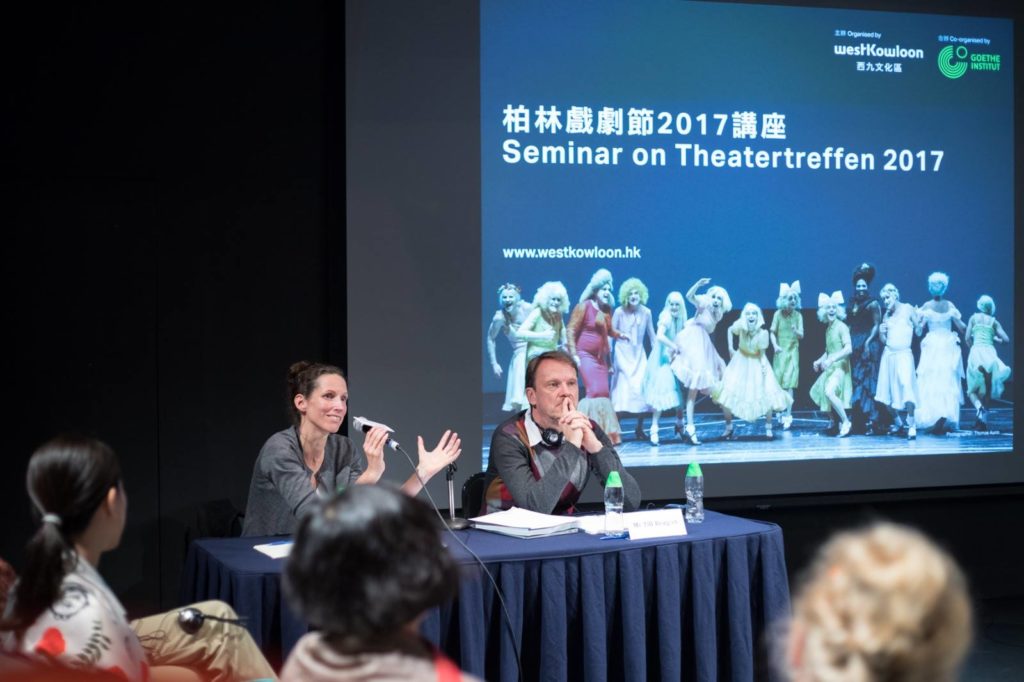
Till Bridgleb & Eva Behrendt at “Theatertreffen” in Hong Kong. Photo Courtesy: West Kowloon Cultural District Authority
Theatertreffen in Hong Kong – Public Seminar on Berliner Theatertreffen 2017
21th-22nd July 2017 at McAulay Studio, Hong Kong Arts Centre
Presented by West Kowloon Cultural District Authority & Goethe-Institut Hong Kong
This post was written by the author in their personal capacity.The opinions expressed in this article are the author’s own and do not reflect the view of The Theatre Times, their staff or collaborators.
This post was written by Clement Lee.
The views expressed here belong to the author and do not necessarily reflect our views and opinions.

